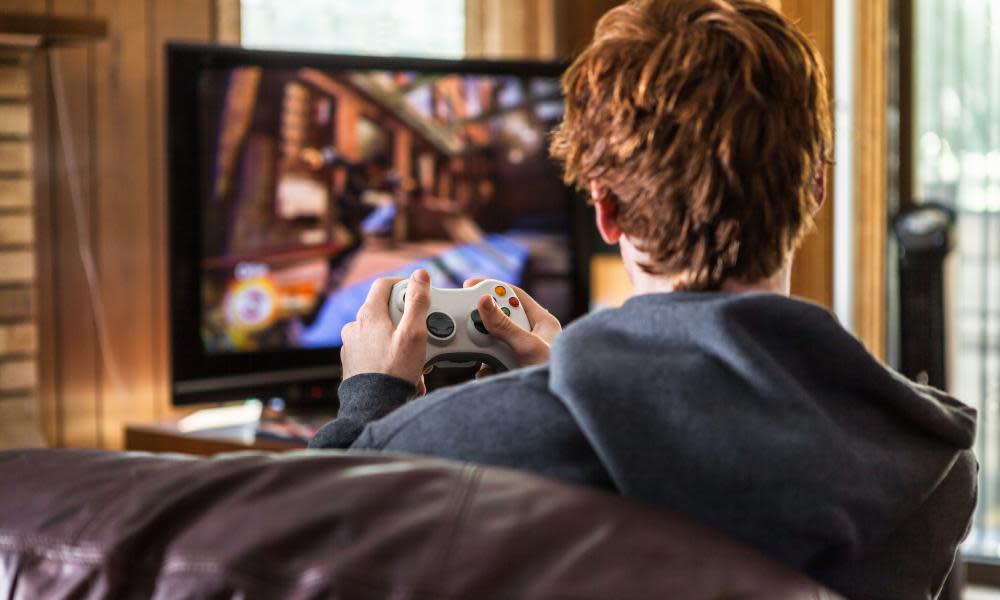I am worried that my introvert teenage son is missing out

The dilemma I am a father to a 17-year-old-son who is doing well at school. He’s in the first year of his A-levels and managing his studies independently. He has a small group of two or three friends. He also enjoys football, playing in a team and helping to manage a younger-age team. At football he has a similar small friendship group of just two or three other boys.
He describes himself as an introvert. He declines nearly all offers that involve socialising. For example, he won’t go on the football team socials as he says he has nothing in common with the wider team. He almost never goes out with his school friends, preferring to stay in and do gaming. If we go out as a family, he will decline (if he has the option, but he would probably go to a family birthday meal out of obligation).
Is all this teenage fear of embarrassment? I’m remembering the good times I had at that age, going to parties, and I feel he is missing out and I want to help him prepare for an independent life. It can be hurtful when he refuses to even hear me out. My current strategy is to make all opportunities available to him, but leave it to him to decide, currently he declines all of them!
Philippa’s answer Personally, I worry about the impact that two years of lockdown has had on all of us, but especially children. I’m an extrovert and I found it hard enough to become sociable again after the lockdowns and I’d had many decades of social experience. I think young people will learn how to build their social muscle, but it might take them longer than it would have had there been no lockdowns, and pushing them does not seem to help.
I expect you are an extrovert, too. You want your son to be content, but you are having difficulties imagining how he can possibly be happy unless he is more like you. At your son’s age, you were going to parties, you had to because you didn’t have the internet to make connections. These days teenagers have more choices about how to connect than we did. And to separate from his dad, he’ll probably want to find his place in the world in his own way, which will not be your way because, as he has told you, he is an introvert.
Ask his permission first before giving advice, or better still resist giving it altogether – unless he asks for it
It can feel hurtful to parents when their teenagers rebel or reject them, or politely refuse to join in, or turn down suggestions, or loving advice. It might be less hurtful if you can manage to see it as a part of him becoming him (he’s not becoming you). When they are children, they belong to the same tribe as their parents, but there comes a time when they need to individuate, become their own person, find their own tribe. So, the more you encourage him to socialise on your terms, the more he’ll probably draw away. He needs to experiment with less input from you, to find his own place in the world.
Some teenagers can only manage to separate from their beloved parents if they believe their parents to be stupid incompetent people who haven’t got a clue about life, and they pull away by being rude. This is more bearable if parents see it as a stage and don’t take it personally. Remember the Mark Twain quote, “When I was a boy of 14, my father was so ignorant I could hardly stand to have the old man around. But when I got to be 21, I was astonished at how much the old man had learned in seven years.”
If you are worried about how much of his time your son spends online gaming, maybe learn more about this world by watching a documentary about it, such as Free to Play (Netflix). But don’t go as far as taking it up, he’d then have to think of another way to separate from his parents.
Don’t analyse him about whether he’s easily embarrassed or not, because if he is, it will make him more embarrassed. You turned out great and it is tempting to think because of that, your way is the best way to do it – and for you it was. But the best thing we can do for our children is to accept them where they are right now, which is more likely to give them the idea that they are good enough as they are and there’s nothing like believing in your own adequacy to give you confidence.
If he had full-blown Hikikomori, he would be a school refusnik, play no sport and wouldn’t have the four or five friends he has, but your son plays team sports, volunteers and studies. He doesn’t want to socialise more than he already does, don’t force him to come up with a reason for that. He knows you are there for him if he needs you and that is a wonderful gift. Ask his permission first before giving advice, or better still resist giving it altogether – unless he asks for it.
Remember what you liked to do in your bedroom behind a closed door when you were 17? That is yet another reason your son may prefer his own company rather than joining in family outings and social occasions. Teenagers need some privacy.
If you have a question, send a brief email to askphilippa@observer.co.uk
Submissions are subject to our terms and conditions


